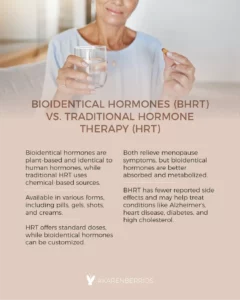

Understanding BHRT: How Bioidentical Hormones Differ from Traditional Hormone Therapy
In the past decade, bioidentical hormones and bioidentical hormone replacement therapy have become extremely popular with patients suffering from specific hormonal imbalances. This specific kind of therapy promises better results than traditional treatments, lowering the risk of adverse side effects, and advocates as being safer and more natural overall. Still, the lack of FDA oversight and not nearly enough testing and research are making experts err on the side of caution.
Here are the pros and cons of bioidentical hormones, the cost of bioidentical hormone therapy, the potential risks associated with these compounds, and how they differ from traditional hormone therapy.
What are Bioidentical Hormones?
Bioidentical hormones are artificial hormones that have been designed to mimic your own body’s hormones made by your endocrine glands. The most common sources of bioidentical hormones come from plants, although some are made by pharmaceutical companies that mix them with other processed hormones.
Bioidentical hormone replacement therapy is mainly used for hormonal imbalances caused by perimenopause and menopause in women, and andropause in men, which are normal signs of aging. However, some women tend to experience early onset symptoms as well as debilitating side effects that lower their quality of life. That’s where BHRT comes into play, helping them manage their symptoms and ease this transition.
In addition to perimenopause and menopause, BHRT is used to manage symptoms of polycystic ovarian syndrome (PCOS), certain cancer treatments, osteoporosis and other bone health issues, transexual transitions, as well as insulin resistance.
Bioidentical hormones that are most commonly used in practice are:
- Estrogen – a steroid hormone that’s responsible for female characteristics and reproduction. Bioidentical estrogen has been FDA-approved for treating menopause and perimenopause.
- Progesterone – another female hormone that’s mostly related to pregnancy, but also plays a big role in a healthy menstrual cycle.
- Testosterone – the most important male sex hormone (although women have it too), that’s responsible for developing male characteristics and essential to male growth.
Bioidentical hormones come in a variety of different forms, like estrogen pills, creams, progesterone patches, gels, shots, and even implanted pellets. Which method will be prescribed to you depends on your specific case as well as your healthcare provider.
Risks of BHRT
Even though the FDA has approved some bioidentical hormones, it hasn’t approved the compounded variation. There hasn’t been plenty of research done on the actual risks of BHRT, but here are some that scientists mention:
- Gallbladder disease
- Blood clots
- Heart disease
- Stroke
- Breast cancer
What is Traditional Hormone Replacement Therapy?
On the other hand, traditional hormone replacement therapy includes chemical-based hormones, meant to treat the same symptoms as BHRT. Unlike BHRT, which is plant-based, conventional hormones used in HRT come from horses, also known as, conjugated equine estrogen. This type of estrogen isn’t identical to human estrogen, although it shares many similarities. This is why many researchers believe that the body’s ability to metabolize them may not be as efficient as it was once thought.
Just like bioidentical hormones, traditional HRT can come in various forms, from pills and creams to shots and pellets. Still, HRT is usually based on estrogen-only or estrogen combined with progesterone.
To ensure the best efficacy and the easiest way of being metabolized, HRT is usually administered in the lowest dose possible, for the shortest amount of time. The only known negative consequences have resulted from long-term use, especially when linked to an increased risk of breast cancer.
Risks of HRT
Unlike with bioidentical hormones, HRT risks have been noted, with the increased risk of breast cancer being the most prevalent one. In addition to that, here are some other risks worth mentioning:
- Blood clots
- Stroke
- Mental health issues like anxiety and depression
Bioidentical Hormones vs Traditional Hormone Therapy
Now that we’ve explained what each therapy consists of, here are some of the most important similarities and differences between the two:
- Bioidentical hormones come from plant-based sources that are identical to the composition of human hormones, while traditional hormones used in HRT come from chemical-based sources, with horse-derived estrogen being the most commonly used.
- Both types of hormones come in a variety of forms, from pills and gels to shots and creams.
- HRT usually comes in standard low doses, while bioidentical hormones can be adjusted depending on the individual and their hormonal make-up.
- Benefits of using bioidentical hormones are the same as traditional hormones, mostly helping relieve the unpleasant side-effects of menopause (night sweats, hot flashes, vaginal dryness, insomnia, and mood swings.
- Since bioidentical hormones are identical to the human composition, experts agree on better absorption and metabolism than traditional hormones.
- Even though the risks for both remain the same and not a lot of research has been done in this space, BHRT has fewer reports of side-effects than HRT.
- Some experts believe that BHRT may help in treating various different conditions, from Alzheimer’s disease and heart disease to diabetes and high cholesterol levels. Still, the research is in its infancy and thus these kinds of claims cannot be supported by studies.
Final Thoughts
Everyone experiences a decline in hormone production as they age, whether from a specific cause or simply due to aging. With it, come the unpleasant side-effects that can dramatically lower your quality of life. From the annoying night sweats and hot flashes to brain fog and lack of libido, perimenopause, menopause, and andropause can make you feel depressed and anxious, cause you to lose your self-esteem, and even promote an unhealthy body weight.
This is why hormonal therapy was even invented, to help relieve those symptoms, for whenever they occur. Over time, scientists discovered new, bioidentical hormones, that might be better suited for our bodies, given that the endocrine makeup could literally mimic ours. That’s why more and more healthcare providers, scientists, and researchers, are reaching for bioidentical hormonal replacement therapy instead of the traditional kind, and exploring different use cases for its administration, whether it’s for menopause or heart disease.

hey there
I'm Karen!
I have found my cancer journey to be a positive and profound transformational experience. I’m inspired to share my healing journey here, and trust you’ll find hope, encouragement and purpose as you discover the healing power that lies within you.
Join
The Mailing List!
By signing up for my newsletter, you agree with our Privacy Policy and Terms & Conditions.



